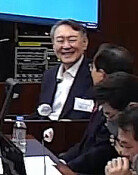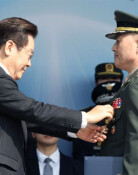Government Hesitant to Deal with High Oil Prices
Government Hesitant to Deal with High Oil Prices
Posted August. 04, 2004 22:40,
International oil prices continued their ascent with West Texas Intermediate (WTI) crude spot prices surpassing $44 per barrel for the first time ever.
Furthermore, the price of Dubai crude, which accounts for over 70 percent of Koreas oil imports, has once again reached an all-time high.
Experts point out that with the current hike in oil prices, the Korean governments oil price predictions were significantly off, and the government did not prepare effective measures.
According to the Korean National Oil Corporation (KNOC) on August 4, the spot price of the WTI crude on August 3 stood at $44.11 per barrel, or a $0.38 increase from the previous day, and its oil price has been increasing for four consecutive days since July 30, reaching its highest point ever. Dubai crude costs $37.51 per barrel, a $0.45 increase from the previous day, marking a record high.
The KNOC explained that oil prices escalated mainly because of problems in supply, mentioning the President of Organization of Oil Exporting Countries (OPEC) Purnomo Yusgiantoros comment, OPEC member countries cannot afford to increase production capacity at the moment, and the Russian governments announcement to increase tax audits on Russian giant oil company Yukos.
With skyrocketing oil prices, the Korean governments standard price of the 10-day average price of Dubai crude, which is used to initiate the level-three high oil price emergency measure, was raised to $35.56 per barrel, a $0.26 increase from yesterday.
Originally, the government was ready to lower taxes on petroleum because it planned to engage in level-two measures if the standard price surpassed $30 per barrel, which is mainly through lowering taxes on imported oil and traffic, and with prices over $35 per barrel, the government goes to level-three measures and releases government oil stock and sets price-limits for petroleum-products.
Nevertheless, the Ministry of Finance and Economy is quite negative towards lowering taxes. The MOFE thinks that the effects of tax reductions are low, and the government has to consider that tax revenues are already low due to the business slump.
On the other hand, with consumer prices unstable--its increasing rates have reached four percent for the first time in 16 months--there is a possibility of tax cuts.
MOFE Assistant Vice Minister Park Byung-won said, Measures to deal with oil prices will be discussed at the August 6 economy ministry session dealing with energy saving, tax cuts, and controlling supply and demand.
Concurrent Finance and Economy Minister and Vice Prime Minister Lee Hun-jae said in a May 7 meeting with journalists, Even most of the New York Wall Street analysts consider the current high oil prices as a temporary phenomenon, adding, Although it is difficult to predict exactly when prices will decline, I think they will fall in about a month or two.
In fact, the government has not offered any measures during the first half, except for lowering crude petroleum quota taxes and cutting petroleum import taxes. Long-term measures such as an energy conservation campaign or expanding oil stock facilities are also the usual measures that the government offers at times of high oil prices.
Furthermore, the government has not adjusted this years economic growth rate prospects of mid-5 percent, which would be possible if the average price of Dubai crude was $28. The average price of Dubai crude from January 1 until August 4 was $31.91 per barrel, or $3.91 higher than the original outlook.
Jin-Hup Song jinhup@donga.com




![두쫀쿠가 뭐라고…영하 8도에 아이들 1시간 줄세운 어린이집 [e글e글]](https://dimg.donga.com/c/138/175/90/1/wps/NEWS/IMAGE/2026/01/09/133126969.3.jpg)
![지하철 타고 가는 북한산성…외국인도 반한 ‘K등산 맛집’[전승훈 기자의 아트로드]](https://dimg.donga.com/c/138/175/90/1/wps/NEWS/IMAGE/2026/01/10/133120824.1.jpg)

